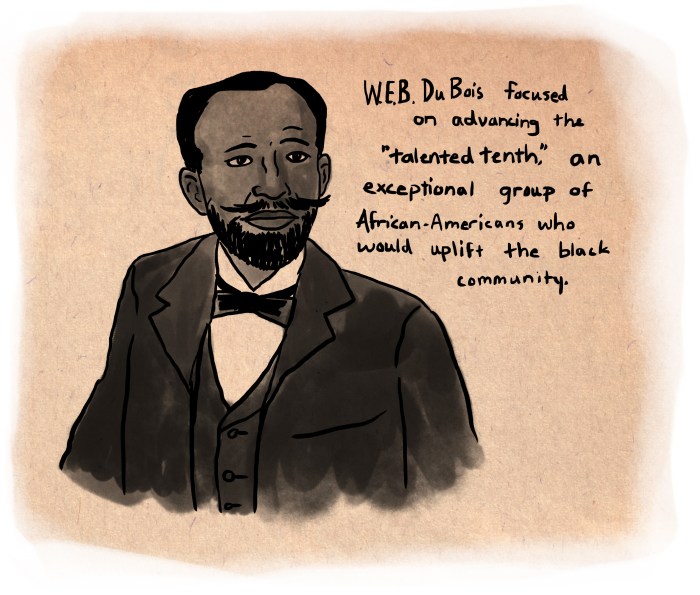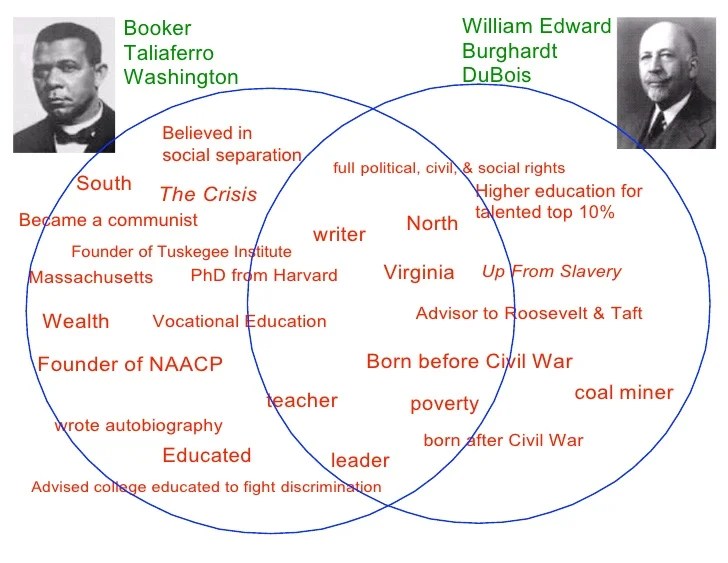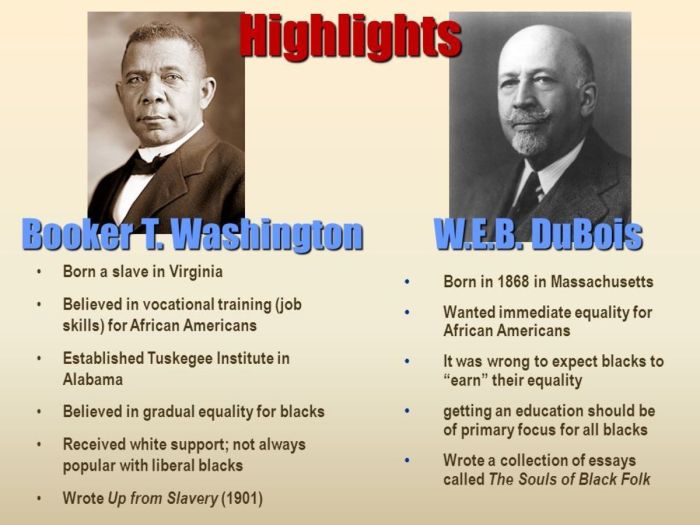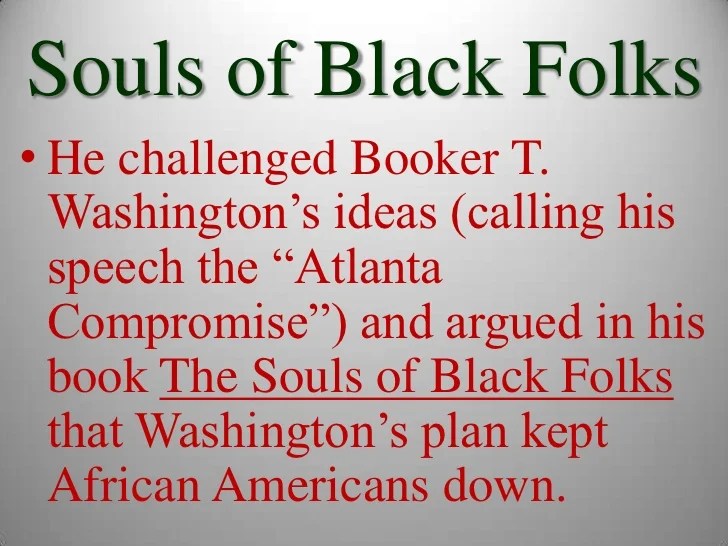Booker t washington and w.e.b. dubois venn diagram – Booker T. Washington and W.E.B. Du Bois, two prominent African American intellectuals and activists of the late 19th and early 20th centuries, held contrasting views on the best path to achieve racial equality and social justice. Washington advocated for industrial education and economic self-sufficiency, while Du Bois emphasized higher education and intellectual pursuits.
This Venn diagram explores the similarities and differences between their philosophies, strategies, and legacies, providing a comprehensive understanding of their contributions to the African American struggle for civil rights.
Booker T. Washington’s Philosophy and Strategies

Booker T. Washington, an influential African American educator and civil rights activist, advocated for a philosophy of “industrial education” for African Americans. He believed that economic self-sufficiency and vocational training were essential for their advancement in a society marked by racial discrimination.
Emphasis on Vocational Training and Economic Self-Sufficiency
Washington emphasized the importance of vocational training in agriculture, trade, and industry. He believed that by acquiring practical skills, African Americans could become economically independent and earn respect in the white-dominated society. He argued that education should prepare individuals for specific occupations and trades, enabling them to contribute to the economy and improve their own lives.
Educational Initiatives: Tuskegee Institute, Booker t washington and w.e.b. dubois venn diagram
Washington’s most significant contribution was the establishment of Tuskegee Institute (now Tuskegee University) in Alabama in 1881. Tuskegee Institute became a model for industrial education, offering courses in agriculture, mechanics, and home economics. It aimed to provide African Americans with the skills and knowledge necessary for economic success and self-reliance.
W.E.B. Du Bois’s Philosophy and Strategies: Booker T Washington And W.e.b. Dubois Venn Diagram

W.E.B. Du Bois, a prominent sociologist, historian, and civil rights activist, espoused a different philosophy from Washington. He advocated for higher education and intellectual pursuits as the path to African American empowerment.
“Talented Tenth” and African American Leadership
Du Bois believed that the “talented tenth” of African Americans, the most educated and skilled, should assume leadership roles in the fight for civil rights and social justice. He argued that higher education would produce a class of intellectuals who could articulate the needs of the African American community and challenge the prevailing racist ideologies.
Advocacy for Higher Education and Intellectual Pursuits
Du Bois criticized Washington’s focus on industrial education, arguing that it perpetuated a system of limited opportunities for African Americans. He believed that higher education was crucial for developing critical thinking skills, fostering intellectual growth, and empowering African Americans to participate fully in all aspects of society.
Intellectual Contributions: “The Souls of Black Folk”
Du Bois’s seminal work, “The Souls of Black Folk” (1903), explored the complexities of African American identity and the impact of racism on their lives. Through essays, poems, and historical accounts, Du Bois provided a powerful critique of racial inequality and advocated for the full humanity of African Americans.
Similarities and Differences in their Philosophies

Despite their differing approaches, Washington and Du Bois shared a common goal: the advancement of African Americans in a society marked by racial discrimination. However, their philosophies and strategies diverged significantly.
Focus on Education
Washington prioritized industrial education and vocational training, while Du Bois emphasized higher education and intellectual pursuits. Washington believed that economic self-sufficiency was the key to empowerment, while Du Bois argued that intellectual development and leadership were essential for social change.
Role of African American Intellectuals
Washington viewed African American intellectuals as having a limited role, focusing primarily on vocational education. Du Bois, on the other hand, saw them as central to the fight for civil rights and social justice.
Common Ground
Despite their differences, Washington and Du Bois shared a commitment to African American empowerment and a belief in the importance of education. They recognized that African Americans needed to overcome the barriers of racism and discrimination to achieve their full potential.
Impact and Legacy of their Ideas
The ideas of Washington and Du Bois had a profound impact on the African American community and continue to shape discussions about education and social justice today.
Impact on African American Community
Washington’s industrial education initiatives helped many African Americans gain practical skills and economic opportunities. Du Bois’s emphasis on higher education inspired generations of African American intellectuals and activists.
Historical Significance
Their philosophies played a crucial role in shaping the course of civil rights and racial equality in the United States. Washington’s focus on economic self-sufficiency contributed to the economic development of African American communities, while Du Bois’s advocacy for higher education and intellectual pursuits laid the foundation for the civil rights movement of the 20th century.
Ongoing Relevance
Their ideas remain relevant today in discussions about education and social justice. Washington’s emphasis on vocational training and economic self-sufficiency resonates with contemporary debates about workforce development and economic empowerment. Du Bois’s advocacy for higher education and intellectual pursuits continues to inspire efforts to promote equity and inclusion in education and society.
Table Comparison of Washington and Du Bois

| Booker T. Washington | W.E.B. Du Bois | |
|---|---|---|
| Education | Industrial education, vocational training | Higher education, intellectual pursuits |
| Leadership | Limited role for intellectuals | Central role for intellectuals |
| Impact | Economic development, self-sufficiency | Intellectual development, civil rights movement |
FAQ Resource
What was Booker T. Washington’s philosophy of “industrial education”?
Washington believed that African Americans should focus on acquiring vocational skills and economic self-sufficiency as a means of achieving racial progress. He established Tuskegee Institute to provide practical training in agriculture, mechanics, and other trades.
How did W.E.B. Du Bois’s philosophy of the “talented tenth” differ from Washington’s approach?
Du Bois argued that the most talented and educated African Americans should pursue higher education and intellectual pursuits in order to become leaders and advocates for their people. He believed that this “talented tenth” would provide the intellectual and moral guidance necessary for social change.
What were the similarities between Washington’s and Du Bois’s philosophies?
Despite their differences, Washington and Du Bois shared a commitment to African American empowerment and the importance of education. They both recognized the need for African Americans to develop economic and intellectual resources in order to overcome racial barriers.